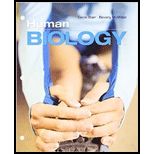
Concept explainers
(a)
To determine: The hormone that promote water conservation.
Introduction: The kidneys regulate water and salt balance in the body. Hormones are proteins that play vital roles in functioning of the body and to maintain homeostasis. Salt and water balance is essential to maintain homeostasis. Hormones are involved in regulating this salt and water balance.
(b)
To determine: The hormone that promote sodium conservation.
Introduction: The kidneys regulate water and salt balance in the body. Hormones are proteins that play vital roles in functioning of the body and to maintain homeostasis. Salt and water balance is essential to maintain homeostasis. Hormones are involved in regulating this salt and water balance.
(c)
To determine: The hormone that promote thirst behavior.
Introduction: The kidneys regulate water and salt balance in the body. Hormones are proteins that play vital roles in functioning of the body and to maintain homeostasis. Salt and water balance is essential to maintain homeostasis. Hormones are involved in regulating this salt and water balance.
Trending nowThis is a popular solution!

Chapter 12 Solutions
Bundle: Human Biology, Loose-leaf Version, 11th + MindTap Biology, 1 term (6 months) Printed Access Card
- 1. Match each vocabulary term to its best descriptor A. affinity B. efficacy C. inert D. mimic E. how drugs move through body F. how drugs bind Kd Bmax Agonist Antagonist Pharmacokinetics Pharmacodynamicsarrow_forward50 mg dose of a drug is given orally to a patient. The bioavailability of the drug is 0.2. What is the volume of distribution of the drug if the plasma concentration is 1 mg/L? Be sure to provide units.arrow_forwardDetermine Kd and Bmax from the following Scatchard plot. Make sure to include units.arrow_forward
- Choose a catecholamine neurotransmitter and describe/draw the components of the synapse important for its signaling including synthesis, packaging into vesicles, receptors, transporters/degradative enzymes. Describe 2 drugs that can act on this system.arrow_forwardThe following figure is from Caterina et al. The capsaicin receptor: a heat activated ion channel in the pain pathway. Nature, 1997. Black boxes indicate capsaicin, white circles indicate resinferatoxin. a) Which has a higher potency? b) Which is has a higher efficacy? c) What is the approximate Kd of capsaicin in uM? (you can round to the nearest power of 10)arrow_forwardWhat is the rate-limiting-step for serotonin synthesis?arrow_forward
 Human Biology (MindTap Course List)BiologyISBN:9781305112100Author:Cecie Starr, Beverly McMillanPublisher:Cengage Learning
Human Biology (MindTap Course List)BiologyISBN:9781305112100Author:Cecie Starr, Beverly McMillanPublisher:Cengage Learning Concepts of BiologyBiologyISBN:9781938168116Author:Samantha Fowler, Rebecca Roush, James WisePublisher:OpenStax College
Concepts of BiologyBiologyISBN:9781938168116Author:Samantha Fowler, Rebecca Roush, James WisePublisher:OpenStax College Human Physiology: From Cells to Systems (MindTap ...BiologyISBN:9781285866932Author:Lauralee SherwoodPublisher:Cengage Learning
Human Physiology: From Cells to Systems (MindTap ...BiologyISBN:9781285866932Author:Lauralee SherwoodPublisher:Cengage Learning





